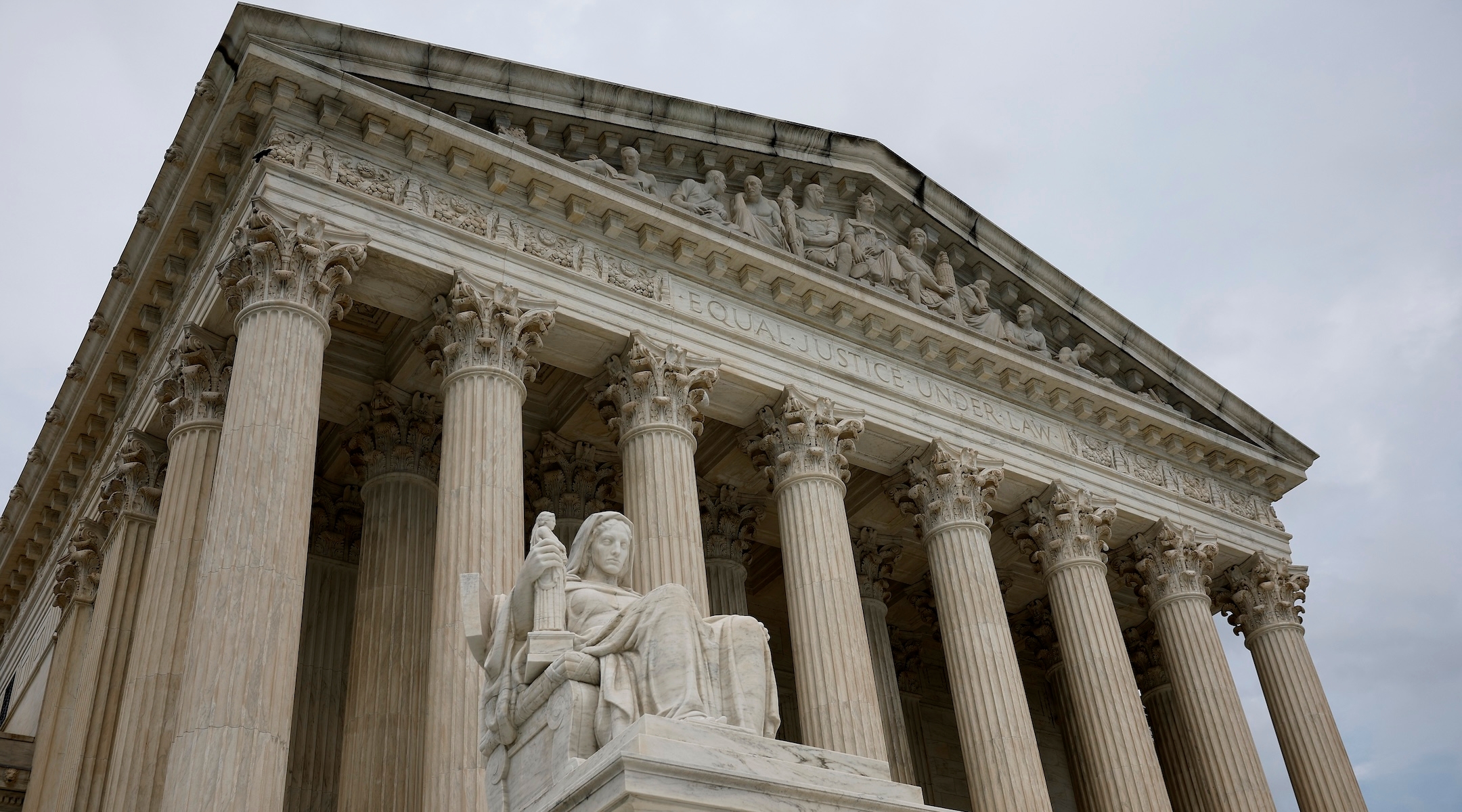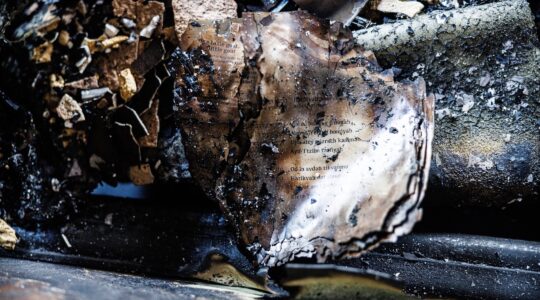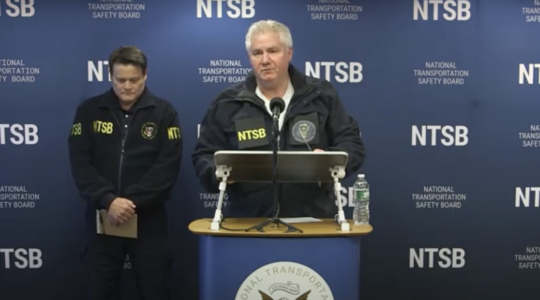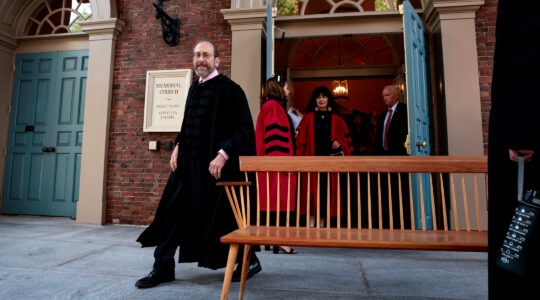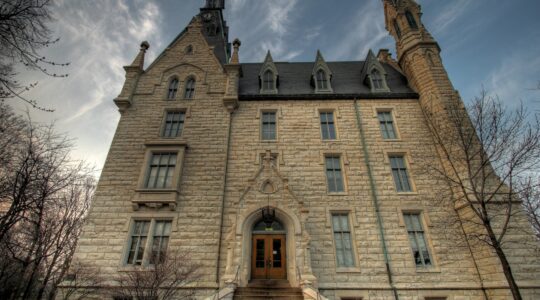After Oklahoma approved a request by the Catholic Church to open a charter school in 2023, lawsuits quickly followed. Courts at both the state and federal levels ruled against the church, finding that a publicly funded school promoting religion would be unconstitutional.
Now, the U.S. Supreme Court has taken up the case, signaling that the justices are willing to consider overturning a longstanding legal precedent protecting the separation of church and state. If the court allows St. Isidore of Seville Catholic Virtual School to become the first government-funded religious school in the country, the consequences for religious education — including for Jewish schools — could be far-reaching.
The school’s backers argue that charter schools should be allowed to teach religion because they are not technically government institutions. They also contend that as long as a state permits charter schools — and nearly all states do — excluding only religious ones violates the constitutional guarantee of religious freedom.
In St. Isidore of Seville Catholic Virtual School v. Drummond, the fate of the school will be decided by a court whose conservative supermajority has steadily expanded religion’s role in public life. The court previously ruled in favor of a public high school football coach who wanted to pray with students on the field, and has allowed government voucher funding for religious schools.
Just before agreeing to hear the St. Isidore case, the court also accepted a case from Maryland concerning whether parents should be able to opt out of LGBTQ-themed lessons for their children on religious grounds.
Some Jewish supporters of St. Isidore believe the case could unlock public funding nationwide. It would lower costs for the parents, most of them Orthodox, who already send their children to private Jewish religious schools. For everyone else, it would make Jewish education a dramatically more accessible option. Less than 5% of non-Orthodox Jewish children attend Jewish day schools, according to estimates.
“I am very supportive of what the Catholic Church is doing here, and if they are successful, it has the potential to be a paradigm shift for American Jews and the opportunity for Jewish education in America,” said Peter Deutsch, a former Democratic congressman who founded a network of Hebrew-language charter schools in Florida.
Deutsch originally envisioned his Ben Gamla charter school network as a way to combat the assimilation of American Jews. But his goal proved elusive, partly because church-state separation required the schools to remain fastidiously secular.
When Oklahoma approved St. Isidore, Deutsch traveled there, hoping to fulfill his original vision of a publicly funded Jewish school. However, after speaking with rabbis and Jewish parents, he concluded that the state’s small Jewish population made the idea impractical.
Could a favorable Supreme Court ruling pave the way for religious charter schools in other states, including those with larger Jewish communities? Experts are cautious about making predictions, given the many legal and political factors at play.
“I suspect we’ll see thousands of Catholic and other religious schools turn into charter schools in every corner of the country in the next year or two,” wrote Michael Petrilli, president of the Thomas B. Fordham Institute, a conservative education policy think tank, in an essay last month. “But that’s not a foregone conclusion, for a few reasons.”
Authorities could enact regulations making it difficult for religious schools to convert to charters, Petrilli explained, or they could decide to halt the chartering of new schools altogether.
A 2019 report counted more than 900 Jewish day schools in the United States, the vast majority of which serve Orthodox communities. The possibility of converting any of them to charter schools, or opening new ones, would vary by state.
Of the 45 states with charter schools, six, including New York, impose strict caps limiting their creation, according to the National Alliance for Public Charter Schools, which opposes religious charter schools. Six other states, including California and New Jersey, have moderate growth caps, while the remaining 33 place no limits on the number of brick-and-mortar charter schools.
Still, Starlee Coleman, the president and CEO of NAPCS, said it’s too early to predict where religious charter schools might expand.
“Right now, it’s impossible to say where we could see religious charter schools open, if they become legal, because we do not know how state laws may change in response to a decision,” Coleman said in an email.
One potential barrier to expansion is a requirement that charter schools be open to all students, according to Michael Helfand, a Pepperdine University law professor specializing in church-state issues and a legal advisor to the Teach Coalition, an Orthodox advocacy group supporting government funding for religious schools. Under such a rule, a Jewish day school couldn’t become a charter school while restricting enrollment to Jewish students.
Few Jewish education leaders are currently discussing the implications of the St. Isidore case. It was not a major topic at last week’s annual conference hosted by Prizmah: Center for Jewish Day Schools, and the group’s president and CEO, Paul Bernstein, said he hadn’t heard of the case when contacted by the Jewish Telegraphic Agency.
Presentations about innovations in affordability at the conference — which drew more than 1,200 Jewish day school leaders and educators from around the world — focused primarily on strategies to limit costs or leverage additional support from within Jewish communities to blunt the cost of tuition.
Still, Jewish schools and their advocates generally consider government regulations and public funding when planning operations and expansion.
For example, increased public funding for nonpublic schools is a major focus of the Orthodox Union’s advocacy efforts. The group supports St. Isidore’s charter bid, said Nathan Diament, its advocacy director.
“We believe very strongly that parents are in the best position to decide how their children should be educated,” Diament said in an interview. “And as a matter of fairness, tax-paying parents from the Orthodox Jewish community or the Catholic community — or any other religious community — should be able to receive some state support for their children’s schooling.”
Two Jewish groups submitted briefs in support of St. Isidore as the Supreme Court considered whether to hear the case.
The Coalition for Jewish Values, which claims to represent more than 2,500 “traditional Orthodox rabbis,” filed an amicus brief together with the General Council of the Assemblies of God, a Pentecostal group.
“This case is not just about one Catholic school in Oklahoma,” the brief states. “Nor is it merely about the viability of religious schools more generally. It is about the ability of religious entities of all stripes to interact with the government and participate in the public square.”
The Jewish Coalition for Religious Liberty, a nonprofit whose leadership has links to the conservative Tikvah Fund, filed a joint brief with a group that had sought to open an Islamic charter school in Minnesota.
Their brief focuses on Oklahoma’s Republican attorney general, Gentner Drummond, who opposes public funding for religious schools and sued to challenge St. Isidore in state court. In June, the Oklahoma Supreme Court ruled in his favor, calling government-funded Catholic schools a violation of the U.S. Constitution.
However, the brief argues that Drummond himself violated the Constitution by expressing hostility toward religious minorities when he warned that the state could later be forced to fund schools of faiths most Oklahomans find “reprehensible.”
In public comments, Drummond cited “radical Islam” and the Church of Satan as examples.
“Today, Oklahomans are being compelled to fund Catholicism,” Drummond said in a press conference last year. “Tomorrow, we may be forced to fund radical Muslim teachings like Sharia law.”
Drummond’s remarks echoed a right-wing argument for church-state separation — a principle that many American Jews have historically supported, albeit more often from a liberal perspective. Groups such as the American Jewish Committee, the Anti-Defamation League and the Union for Reform Judaism have long argued that a secular public sphere protects both religious freedom and the Jewish community. These groups have not gotten involved in the St. Isidore case, but the Jewish federation serving Oklahoma City said the concept of a religious charter was unconstitutional.
The most prominent Jewish voice today advocating against St. Isidore is that of Rachel Laser, the head of Americans United for Separation of Church and State. She believes that the impetus behind the project is Christian nationalism and that the erosion of church-state separation is harmful to Jews and other religious minorities.
“Religious public charter schools are one piece of a larger Christian Nationalist agenda to infuse Christianity into public schools,” Laser said in a 2o23 statement. “We’re witnessing a full-on assault on church-state separation and public education — and religious public charter schools are the next frontier.”
But for Deutsch, that argument hasn’t held up. He cites as evidence low levels of Jewish knowledge and rising assimilation among American Jews.
“If you think Jewish peoplehood and faith have value in terms of continuity, looking at American Jews today and saying that’s a success story today is absurd,” he said. “Clearly, Jewish individuals have done extraordinarily well, but the Jewish community is in a death spiral. The only way to prevent what’s happening is through education.”
JTA has documented Jewish history in real-time for over a century. Keep our journalism strong by joining us in supporting independent, award-winning reporting.
